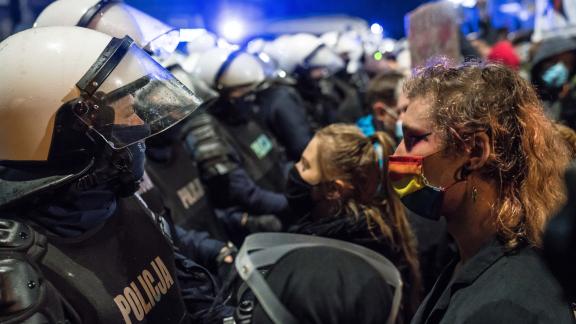Letter sent to the President of the European Commission, Commissioners, the German Presidency and the President of the European Parliament by IPPF EN and CIVICUS. Photo credit: Spacerowiczka.
Subject: Concerns over use of excessive force against peaceful protesters in Poland, following decision of illegitimate Constitutional Tribunal which violates human rights
Dear Presidents,
We write to bring to your attention our deep concerns regarding developments unfolding in Poland, due to the use of excessive force during peaceful protests against the deteriorating situation of the rule of law and human rights in the country.
On 22 October 2020, the Polish Constitutional Tribunal ruled that access to abortion care on the grounds of “severe and irreversible foetal defect or incurable illness that threatens the foetus’ life” is unconstitutional. This decision imposes even more severe restrictions on women’s sexual and reproductive health and rights and amounts to a near ban on all legal access to abortion care in the country. This ruling will have a devastating impact on women’s health and put their lives at risk, and is in violation of Poland’s international human rights obligations. As noted in our previous letter[1], the government has been implementing measures that undermine judicial independence and the rule of law in Poland, thus raising concerns about the legitimacy of the Constitutional Tribunal. These concerns have been denounced by the EU and other institutions.
Following this decision, tens of thousands of people have taken to the streets to express their discontent with the Polish government under the ruling PiS (Law and Justice) party. The protests have spread across Poland and are currently in their seventh day. The protests, which were originally led by women’s rights groups such as Strajk Kobiet (Women’s Strike), are now widely supported by a variety of groups of Polish people, including miners, taxi drivers, farmers and trade unions[2]. Due to current COVID-19 restrictions on public gatherings, protesters had to be inventive, including by using their cars to block traffic. On 28th October, the protest organisers are planning on holding a women’s strike, similar to those that took place in 2016 in response to a previous effort to restrict the abortion law.
We are concerned that these peaceful protests are being met with excessive force and violence from law enforcement officials and far-right groups close to the ruling party. Footage documented by activists and journalists show police using teargas, pepper spray and physically assaulting protesters[3]. Videos document how in one instance a police officer drags a protester by the feet and hits him with a gas cylinder, while a woman trying to stop this is elbowed in the face by an officer.[4] Activists on the ground have documented 17 arrests thus far, but these could be underreported. In one case reported on social media, a protester was detained in the middle of the night after returning home from a peaceful protest in Poznan[5]. In Warsaw, one parish priest gave far-right activists permission to defend his church from protesters, and they began physically removing women from the premises as a result[6].The actions of far-right groups are particularly worrying given how they are often able to act with impunity, in stark contrast with the repressive measures taken by the authorities against human rights defenders.
The use of excessive force by law enforcement officials, and their failure to protect peaceful protesters from violence by other civilians, are contrary to standards set out in international human rights law and the EU Charter of Fundamental Rights[7], which guarantee the right to peaceful assembly. We urge you to prevent history from repeating itself as we recall the inaction of the Polish police, when Pride protesters were violently attacked by far-right groups during the first Bialystok LGBTIQ equality march on 20 July 2019. The Prime Minister announced that the military will be deployed to the streets on 28th October, officially for COVID-19 reasons[8]. Guidelines from the UN Special Rapporteur on Freedom of Association and Assembly make it clear that as a general rule, the military should not be used to police assemblies. Even in exceptional circumstances where this becomes necessary, the military must be subordinate to civilian authorities.[9] It is unacceptable that the Polish government is using COVID-19 as a pretence to repress peaceful protests.
These attacks take place within the context of rapidly declining civic space in Poland, which includes the erosion of media freedom and judicial independence,[10] and a crackdown on LGBTI and human rights activists and associations[11]. Soon, women's right to be protected from domestic violence could also be threatened by an upcoming decision of the Constitutional Tribunal, which could declare the Istanbul Convention unconstitutional[12].
We call on you as EU leaders to denounce the use of excessive force and violence against peaceful protesters and to protect the rights and lives of European citizens against their authoritarian governments. We also call on EU leaders to condemn attacks and violence perpetrated by non-state actors including far-rights groups and ensure that those who attack protesters are held accountable.
[1] https://www.ippfen.org/news/poland-decision-constitutional-tribunal-may-lead-human-rights-violations
[2] https://notesfrompoland.com/2020/10/26/farmers-taxi-drivers-and-miners-show-support-for-abortion-protests-in-poland/?fbclid=IwAR2ObBYgSbSLeJorN1D-PIPe-yLGiB6pCfKi8t22FamTcNhmWvKlNdz8oSs
[3] https://monitor.civicus.org/updates/2020/10/28/thousands-protest-constitutional-tribunal-imposes-near-ban-abortion/
[7] https://ec.europa.eu/info/aid-development-cooperation-fundamental-rights/your-rights-eu/know-your-rights/freedoms/freedom-assembly-and-association_en
[8] https://www.polishnews.co.uk/military-gendarmerie-directed-to-help-the-police-ministry-of-defense-this-is-standard-activities/
[9] A/HRC/31/66, para. 66: https://www.ohchr.org/Documents/HRBodies/CCPR/GC37/SR_FreedomPeacefulAssembyandassociation.docx
[10] https://monitor.civicus.org/updates/2020/03/16/new-law-set-erode-judicial-independence-and-municipalities-declared-lgbti-free-zones/
when
country
Poland
Subject
Abortion Care












